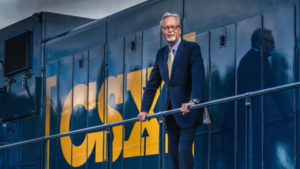BNSF employee, Sen. Frank Lautenberg win environmental awards
Written by jroodFebruary 14, 2001 The Association of American Railroads said that Charles Keltner, a BNSF employee from Fort Worth, Texas, has been awarded this year's John H. Chafee Environmental Excellence Award. U.S. Senator Frank R. Lautenberg (D-N.J.) also was honored with the Congressional Chafee Award, which each year goes to a member of Congress who demonstrates dedication to the environment.
Named after the late
Senator from Rhode Island – a strong advocate for conservation, environmental
causes, and who appreciated the environmental advantages of rail transportation
– the Chafee award recognizes a railroad employee and a member of Congress who
have demonstrated the highest level of environmental stewardship during the
previous year.
"It is particularly
appropriate that around Earth Day each year, we announce these awards to honor
individuals that represent environmental excellence in the railroad industry
and in shaping our nation’s public policy," said AAR President and CEO
Edward R. Hamberger.
"Senator Lautenberg
has emphasized his support of the environment and his support for an
environmentally sound, balanced transportation system throughout his
career," Hamberger said. "Like the Senator, Charlie Keltner is
committed to serving not only his company, but also the environment."
Keltner, senior manager
of corporate facilities for BNSF, was one of six railroad employees nominated
to receive the Chafee Award. Among his accomplishments are programs at the BNSF
corporate campus that have reduced irrigation needs by 30 million gallons,
implementation of a single-stream recycling program that recovers almost half
of all waste generated and use of innovative roofing materials to reduce air
conditioning needs by up to 15 percent.
In addition to Keltner,
the other railroaders nominated for the Award were:
Bob Karwoski. Bob
Karwoski is special agent in charge with Norfolk Southern’s police department
in Pittsburgh. He is well-known for his excellent relationships with local
emergency personnel, which have proven invaluable in coordinating actions with
local responders during two separate hazmat situations in Pennsylvania. He
currently is an active member of the Pennsylvania Emergency Management Agency
Region 13 group and was a pioneer in the railroad’s efforts to develop
evacuation plans and security contingency measures associated with security
sensitive events in the northeast.
Ron Kotylak. Ron Kotylak
is supervisor of structures for Canadian Pacific Railway at Coquitlam Yard in
Port Coquitlam, B.C. He has led efforts to protect water resources along CP’s
infrastructure and has changed the way work is conducted near streams and
creeks to reduce or eliminate practices that may have a negative impact on
water resources and habitat. An example of this occurred last year when he
organized an effort that allowed adult salmon to reach spawning grounds in
spite of a deteriorated culvert that was blocking their access.
Chuck Kunkel. Chuck Kunkel
is senior manager, research and development, with Union Pacific in Omaha. He is
responsible for testing and monitoring the infrastructure that transports,
stores, and dispenses more than 1 billion gallons of diesel fuel per year. That
includes more than 100 miles of pipelines, 100 million gallons of storage and
50 fuel sites. Under his leadership, spills have been cut to such an extent
that there has been a 58 percent reduction over seven years in fuel recovered
at wastewater treatment plants, in spite of a 13 percent increase in volume
over the same period.
Kenneth G. Lewis. Ken
Lewis is director of advanced engineering with CSX Transportation in
Jacksonville, Fla. He has been involved with improving energy efficiency for
locomotive operation and train handling practices throughout his 26-year
railroad career. He was responsible for one program that reduced fuel
consumption by 19 million gallons between 2005 and 2009, reducing carbon
dioxide emissions by more than 200,000 tons. Another one of his projects is
estimated to have reduced the company’s fuel consumption by up to eight
percent.





